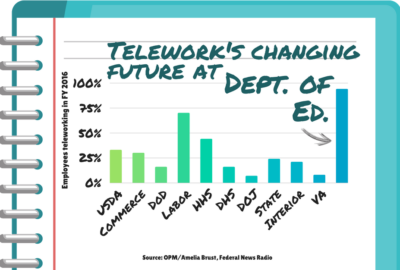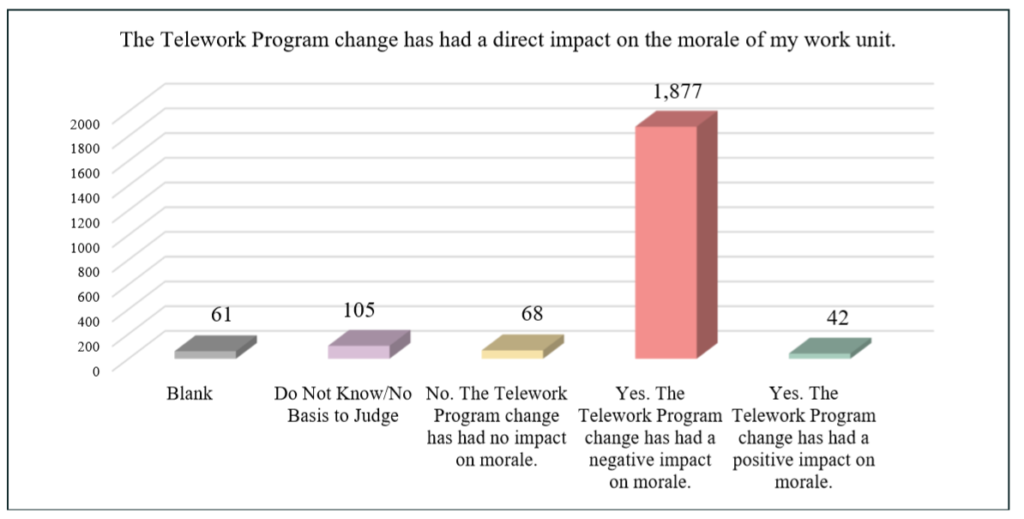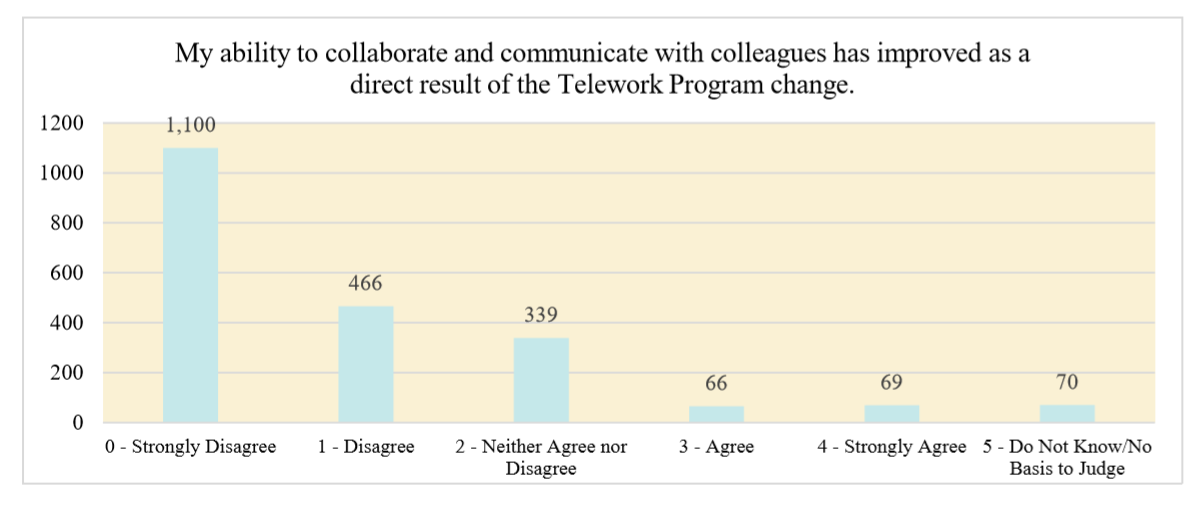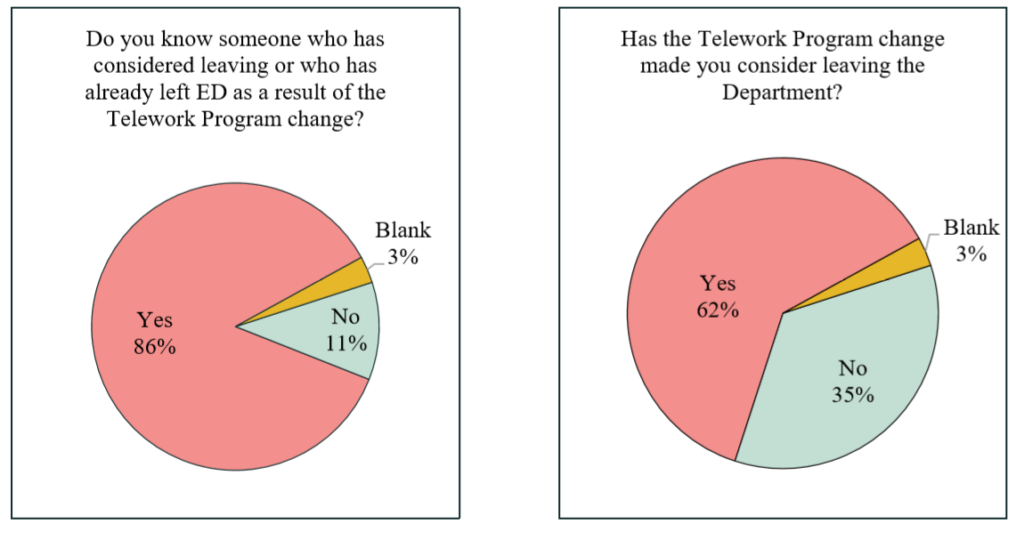
Exclusive
After telework cuts, Education Dept. staff see little benefit from more office time
The Education Department changed its telework policy last year, requiring most employees to show up to the office at least four days a week, which the agency...
Best listening experience is on Chrome, Firefox or Safari. Subscribe to Federal Drive’s daily audio interviews on Apple Podcasts or PodcastOne.
When the Education Department changed its telework policy last year, requiring most employees to show up to the office at least four days a week, the agency justified the change as an effort to “enhance collaboration between program offices and improve customer service to our internal and external stakeholders.”
But nine months into the revised telework policy, a majority of agency employees have told leadership that more time spent in the office hasn’t led to increased productivity, according to the results of an internal survey obtained by Federal News Network.
If anything, the vast majority of employees said cutbacks to the telework program have decreased productivity, required staff to use more sick leave and annual leave, and hurt agency morale to the point that many have considered leaving the agency.
Beyond the perspective of front-line employees, the vast majority of agency supervisors who took the telework survey saw no positive impact from having employees in the office at least four days a week.

Despite the survey responses, the agency will keep the telework changes in effect through next year, with the expectation that the workforce will adapt to these changes.
“The feedback in the attached report shows that a significant number of employees and managers are still adjusting to the change, and the significant number of changes made across the Department last year may be a compounding factor,” the agency wrote Tuesday in an all-staff email. “Accordingly, the efforts to achieve the intended outcomes of improved collaboration and productivity should continue, and the current policy will remain in effect for the 2020 calendar year.”
Aside from the cutbacks to telework last year, the agency also went through a major enterprise-wide reorganization and overhauled its IT infrastructure.

Angela Morabito, an agency spokeswoman, told Federal News Network that the current telework policy was put in place to improve the way the agency serves internal and external stakeholders, and that “the nature of the work we do requires a greater degree of physical presence in the offices than was happening under the old policy.”
Within the agency, however, the survey results have renewed concerns from employees about whether the cuts to telework are intended to shrink the agency’s workforce.
This summer, 86% of Education Department employees who took the survey said they knew coworkers who considered leaving or had already left the agency as a result of the telework program change.
Asked directly if they considered leaving the agency because of the telework changes, 62% of respondents said they had thought about it.
“I wish they’d just admit the purpose is to get people to quit,” an Education Department employee told Federal News Network.
Between the start of the Trump administration and June 2018, the agency’s workforce has decreased by nearly 400 positions.
However, Morabito said agency data shows a lower attrition rate for fiscal 2019 compared to the previous year.

More than 2,100 Education Department employees, or 59% of its total workforce, completed the survey, which ran from July 16-30.
According to the agency’s Office of Human Resources, at least 74% of survey respondents had a telework agreement in effect when they responded to the survey.
A majority of survey respondents (67%) said they had a fixed schedule of one day of telework per week, while nearly 20% of respondents used telework on an ad-hoc basis.
When the Education Department announced the policy change in May 2018, its Office of Management assured staff that it would make reasonable accommodations for certain employees, such as those with disabilities and remote workers.
The Office of Management also said employees who work outside the “local commuting area” of agency facilities will be allowed to continue to work remotely.
According to the survey, a total of 6% of staff continue to telework more than one day a week, the maximum number of telework days permitted for most employees.
A majority of survey respondents said telework improved productivity, allowed for a better work-life balance, and reduced commute time and expenses.
However, respondents said scaling back that workplace flexibility has hurt the performance metrics that the agency sought to improve.
Overall, 85% expressed some level of dissatisfaction with the telework policy change, and only 6% gave the current telework program a positive rating.
Related Stories
Nearly the same number of employees said the new telework policy didn’t improve their ability to collaborate or communicate with colleagues, nor did they see an increase in productivity in their work unit as a result of these changes.
The dissatisfaction extends beyond rank-and-file employees. More than 77% of supervisors who took the survey expressed some level of dissatisfaction with the telework changes.
Of those, 40% of supervisors had worked for the federal government between 11 and 20 years, while 34% had more than 20 years of federal service.
The Education Department is just one of several agencies to rein in its telework policies under the Trump administration.
Decisions to roll back telework policies at the Agriculture Department, Interior Department and the Social Security Administration have also met strong opposition from federal employees and their unions.
Copyright © 2025 Federal News Network. All rights reserved. This website is not intended for users located within the European Economic Area.
Jory Heckman is a reporter at Federal News Network covering U.S. Postal Service, IRS, big data and technology issues.
Follow @jheckmanWFED





